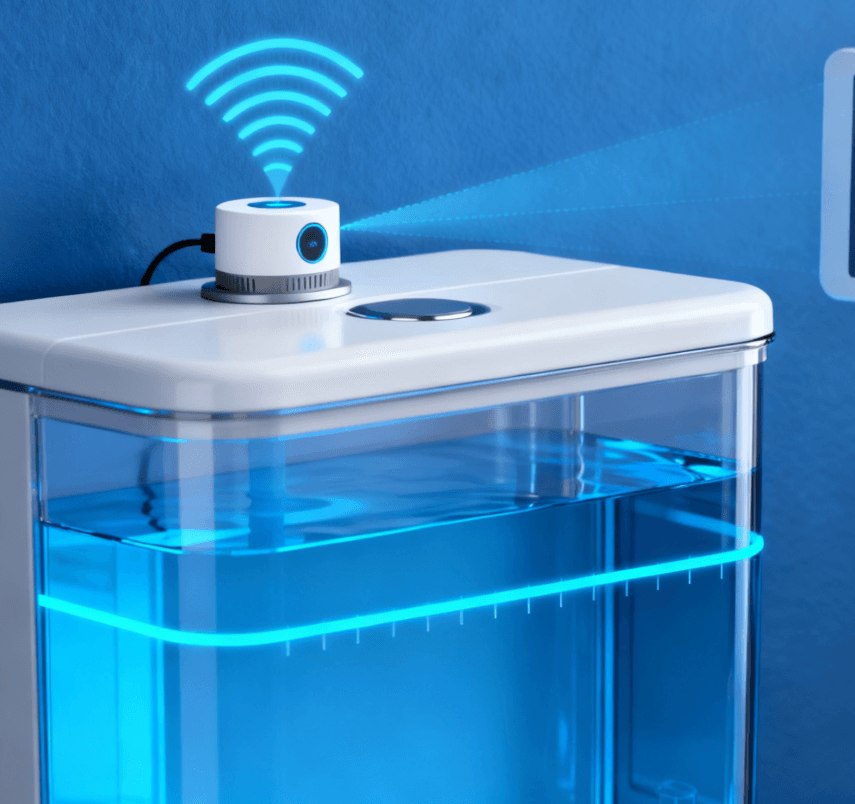In today's fast-paced world, efficient water management is critical, especially for homes with ground or rooftop water tanks. Monitoring water levels is essential to prevent shortages, overflows, and unnecessary waste. However, traditional methods often fall short—manual checks are time-consuming, intrusive installations risk tank damage, and unreliable sensors lead to frustrating false or missed alarms. If you've been searching for a better way, the Millimeter-Wave (mmWave) Radar Level Sensor provides a groundbreaking, high-reliability solution for seamless water tank monitoring.
🚨 Why Traditional Water Tank Monitoring Solutions Fail: The Four Core Pain Points
Homeowners and property managers commonly face these critical challenges when monitoring tank levels:
-
Intrusive Installation Requirements: Many sensors require drilling holes in the tank or its lid. This always creates a risk of leakage, compromises structural integrity, and complicates the installation process.
-
Lack of Reliability in Harsh Environments: Ultrasonic sensors are highly susceptible to temperature changes, condensation, dust, or foam on the surface. This environmental sensitivity often leads to unstable readings and alarm failures at critical low levels.
-
Missing Smart Integration: In the age of connected homes, equipment should work seamlessly with platforms like SmartThings or Alexa. The lack of smart integration means monitoring is fragmented and prevents automation, such as voice-controlled level checks or automatic pump activation.
-
High Maintenance and Low Durability: Sensors exposed to corrosive liquids or harsh outdoor weather often require frequent maintenance and recalibration, adding hidden costs and demanding constant attention.
Customers need a solution that is non-intrusive, stable, and smart—and that’s exactly where mmWave radar technology provides a clear answer.
🔬 What is a mmWave Radar Level Sensor? (Non-Contact High-Reliability Technology)
The Millimeter-Wave (mmWave) Radar Level Sensor operates at high frequencies, using radar waves to measure liquid levels without making physical contact with the fluid. Unlike standard radar, mmWave uses shorter wavelengths to create an extremely focused beam, ensuring exceptionally high accuracy regardless of tank size or material (suitable for plastic, concrete, or metal).
Key Features Include:
-
Non-Contact Design: Can be mounted externally or through a non-metallic tank lid, eliminating the need for drilling.
-
Strong Environmental Immunity: Measurement results are unaffected by steam, foam, dust, or temperature fluctuations.
-
IoT and Connectivity: Supports industrial standards and wireless protocols for easy smart integration.
-
Low Power Design: Perfectly suited for remote, battery-powered or solar-powered applications.
🚀 How mmWave Solves Real-World Problems: Core Advantages
✅ Non-Intrusive Installation for Peace of Mind
With no drilling required, the sensor can be mounted quickly and safely, completely eliminating the risk of leaks or structural damage to the tank. Installation is fast and can be done with minimal tools.
✅ Maximum Reliability and Accuracy
The advanced technology ensures highly stable readings even when conditions are challenging (such as high humidity or dust). Unlike older technologies that suffer from reading drift due to environmental noise, mmWave ensures timely and accurate low-level alerts.
✅ Seamless Smart Home Integration and Automation
mmWave sensors are compatible with IoT platforms like SmartThings and Alexa. Users can check levels via voice command or automatically trigger a refill pump when the level drops. The accompanying application provides real-time data, historical trends, and customized alerts.
✅ Extremely Low Maintenance and Durability
With no mechanical parts and a high ingress protection rating, the sensor is resistant to extreme environments. This results in many years of reliable service without the need for frequent checks, calibration, or replacement, saving significant time and cost.
💡 Why Choose mmWave Over Other Solutions? (Qualitative Comparison)
|
Feature |
mmWave Radar |
Ultrasonic Sensor |
Pressure Transmitter |
|---|---|---|---|
|
Accuracy |
Extremely high and stable |
Moderate, easily affected by temperature |
Dependent on immersion depth, susceptible to corrosion |
|
Environmental Immunity |
Immune to steam, dust, and foam |
Highly susceptible to vapor and temperature interference |
Submersible; liquid properties affect longevity |
|
Installation |
Non-Contact, No Drilling |
Non-Contact |
Intrusive, requires drilling or submersion |
|
Reliability |
Extremely high, long-term stability |
Lower, requires occasional recalibration |
Moderate, prone to wear |
|
Smart Integration |
Excellent, supporting multiple protocols |
Basic connectivity |
Limited |
mmWave radar stands out due to its versatility and superior immunity to environmental factors, offering a decisive advantage in both reliability and smart integration.
❓ mmWave Radar Level Sensor Frequently Asked Questions (FAQ)
-
How accurate is the mmWave sensor? It provides exceptional measurement accuracy and remains reliable even in environments with steam or foam.
-
Can it integrate with smart home platforms? Yes. Through its supported protocols, it can integrate with platforms like SmartThings and Alexa for voice control and automated actions.
-
Is drilling required for installation? No drilling is required. Installation is typically completed quickly, followed by calibration via a mobile application.
-
What is the maintenance requirement? Extremely low. As it has no mechanical parts, it is designed to provide years of reliable service without the need for calibration or frequent physical checks.
Conclusion: The Future of Water Tank Monitoring
Millimeter-Wave Radar Level Sensors provide a highly reliable solution for residential and commercial water management through non-intrusive installation, superior stability, and smart integration. They directly address the key failings of traditional solutions—leak risks, environmental interference, and cumbersome maintenance—empowering users to manage water levels proactively and efficiently.



